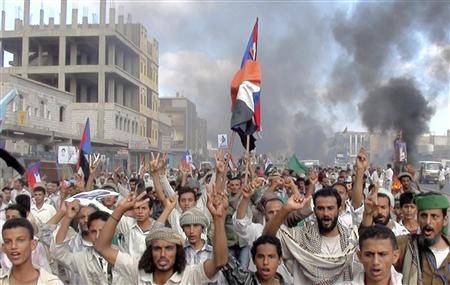Security forces in the Yemeni capital battled heavily armed supporters of the country’s most powerful tribal leader on Thursday as President Ali Abdullah Saleh ordered the tribesman’s arrest.
The leader, Sheikh Sadiq al-Ahmar, in turn accused Saleh of dragging Yemen into civil war, speaking after hours of clashes late on Wednesday and overnight in which at least 24 people were killed.
Meanwhile a website linked to the defence ministry said 28 more people died when an explosion ripped through an ammunition store belonging to the al-Ahmar tribal opposition.
But a dissident military official whose troops are stationed in the area denied the existence of an ammunition store there. AFP could not immediately confirm the reports independently.
Amid the escalating bloodshed, US Secretary of State Hillary Clinton urged all sides in Yemen “immediately to cease the violence.”
“We are very troubled by the ongoing clashes,” she said in Paris. “We call on all sides immediately to cease the violence.”
Washington, which has urged Saleh to quit, ordered what it termed “non-emergency” embassy staff to leave Yemen “while commercial transportation is available.”
EU foreign policy chief Catherine Ashton urged all sides to cease all violence and renewed a call for Saleh to transfer power.
“I trust President Saleh will listen to the demands of the Yemeni people and Yemen’s friends,” she said.
“It is time for showing his genuine commitment to a peaceful and orderly transition. It is time for President Saleh to transfer power now.”
Britain also said it was reducing staffing levels in its embassy by temporarily removing four people.
British Foreign Secretary William Hague “urgently” called on Saleh to sign an agreement brokered by the Gulf Cooperation Council “allowing for a peaceful transition and preventing further bloodshed.”
France also condemned the violence.
“We call on the authorities and the other sides in the conflict in the capital to make the fighting cease and protect the population in areas affected by the armed clashes,” foreign ministry spokesman Romain Nadal said.
Saleh has ordered the arrest of the powerful dissident Sheikh Sadiq and his nine brothers, the defence ministry in Sanaa said.
“The president has ordered the arrest of the sons of Ahmar to bring them to justice for armed rebellion,” the ministry’s 26sep.net news website said.
The state news agency Saba said that in Wednesday clashes in Sanaa six civilians including a woman were killed.
Tribal sources said that 12 soldiers from the elite Republican Guard and six civilians and tribesmen were killed in other clashes.
The latest fighting brought to at least 68 the number killed since Monday, according to an AFP tally based on reports from medics, the government and tribal sources. Scores were also wounded.
The clashes have pitted loyalist security forces against clansmen from several tribes fighting in support of Sheikh Sadiq who rallied to the opposition in March.
The fighting that spread to the Arhab district north of the airport late on Wednesday prompted its closure, with flights diverted to the southern city of Aden, aviation and tribal sources said.
Airport director Naji al-Marqab insisted it was functioning normally on Thursday, Saba reported.
Blasts echoed through Sanaa in what residents described as the fiercest clashes since Monday.
The clashes were centred on Al-Hasaba district, where Sheikh Sadiq lives.
Meanwhile, more protesters abandoned University Square, which has been the epicentre of anti-regime protests for months in Sanaa, amid the escalating violence.
However, protest organisers have called for demonstrations on Friday, calling it “The Friday Peaceful Revolt.”
Saleh loyalists, meanwhile, called for a “Friday of Law and Order” counter-protest.
The president, in power since 1978, has resisted strong diplomatic pressure to sign up to proposals by Yemen’s wealthy Gulf neighbours that would see him leave office in return for a promise of immunity from prosecution.
Sheikh Sadiq’s tribesmen have been fighting security forces since Saleh again rejected the Gulf plan at the weekend.
Tribal loyalties run deep in Yemen, the Arab world’s poorest country, which has an estimated 60 million firearms in private hands — roughly three for every citizen.
Clansmen of the Arhab tribe belonging to the powerful Bakil federation of hardline cleric Abdul Majid al-Zindani, who faces US sanctions as a “terrorism financier,” have also been fighting Saleh loyalists.










